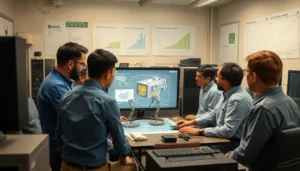Table of Contents
ToggleIn a world where robots might soon outnumber humans, pursuing a robotics engineering major could be your ticket to the future. Imagine being the mastermind behind sleek automatons that can flip pancakes or save lives. It’s not just a degree; it’s a chance to play god—well, at least in the realm of machines.
Overview Of Robotics Engineering Major
Robotics engineering combines mechanical engineering, electrical engineering, and computer science. Students pursuing this major study concepts like automation, artificial intelligence, and robotics systems design. Specialized courses focus on creating intelligent machines capable of performing tasks previously exclusive to humans.
Hands-on experience is integral to this field. Students often engage in laboratory work, working on real-world projects that develop critical thinking and problem-solving skills. Internships frequently provide additional practical experience, enhancing employability.
Various career paths are available to graduates. They commonly pursue roles as robotics engineers, automating manufacturing processes or developing autonomous vehicles. Other opportunities exist in research and development sectors, where innovation plays a key role.
The job market for robotics engineers continues to expand. According to the Bureau of Labor Statistics, employment in this field is projected to grow by 9% from 2020 to 2030. This increase reflects the rising demand for automation and robotics in industries such as healthcare, agriculture, and logistics.
Certification options also exist for those looking to enhance their qualifications. Programs like Certified Automation Professional offer additional credentials that showcase expertise in automation technologies. Students benefit from these certifications, increasing their competitiveness in the job market.
Overall, the robotics engineering major stands out as an exciting opportunity for students interested in technology, innovation, and shaping the future. Aspiring engineers find ample prospects to express creativity and develop advanced solutions that improve daily life.
Curriculum And Coursework

The robotics engineering major emphasizes a strong foundation in various technical disciplines. Students engage with complex theories and practical applications through a structured curriculum.
Core Subjects
Core subjects form the backbone of the robotics engineering program. Topics like mechanical design, electrical circuits, and programming principles provide essential knowledge. Automation systems and robotics kinematics deepen understanding of dynamic operations. Courses in artificial intelligence introduce students to machine learning algorithms and decision-making processes. Laboratory sessions complement theoretical learning, allowing students to apply concepts in real-world scenarios. Collaboration on projects fosters teamwork and enhances problem-solving skills, preparing graduates for future challenges.
Electives And Specializations
Electives and specializations allow students to tailor their education to personal interests. Fields such as robotic ethics, data analytics, or human-robot interaction enrich the academic experience. Advanced courses in control systems and computer vision expand technical expertise. Choosing a specialization can lead to unique career paths, such as robotics software development or automated system design. Opportunities for internships or research projects further enhance practical skills. Students can explore these options to gain a competitive edge in the job market.
Career Opportunities
Graduates of a robotics engineering major enjoy diverse career opportunities in numerous industries. They can explore fields such as manufacturing, healthcare, and agriculture, where robotics plays a critical role in driving efficiency and innovation.
Job Roles In Robotics
Job roles in robotics include robotics engineers, automation specialists, and control systems designers. Robotics engineers focus on designing and developing robotic systems. Automation specialists improve processes through automated solutions. Control systems designers create software and hardware to manage robots effectively. Many professionals also work on research and development, bringing new technologies to market. They might focus on areas such as autonomous vehicles, where innovation occurs rapidly. Each role requires a unique blend of skills in mechanical engineering, electrical engineering, and programming.
Industry Demand And Trends
Industry demand for robotics professionals continues to grow, reflecting a projected 9% job market increase from 2020 to 2030. Businesses increasingly seek automation solutions, particularly in logistics and healthcare. Sectors such as agriculture benefit from robotics for crop management and precision farming. Advanced technologies like artificial intelligence and machine learning integrate into robotics, driving significant changes. Organizations consistently invest in automation to maintain a competitive edge. As a result, graduates can expect numerous opportunities as robotics transforms traditional industries through innovative practices.
Skills Required For Success
Success in robotics engineering requires a blend of technical and soft skills. Mastering these skills enhances a graduate’s potential to impact various industries positively.
Technical Skills
Strong programming proficiency is essential for robotics engineers. Mastery of languages like Python, C++, or Java enables effective software development for robotic systems. Mechanical design expertise plays a crucial role in creating functional and efficient machinery. Knowledge of electrical circuits facilitates understanding of hardware interactions. Familiarity with automation and AI algorithms empowers engineers to develop intelligent systems. Experience with robotics simulation tools also proves beneficial, allowing for testing and refinement of designs. Overall, a solid technical foundation equips graduates to tackle complex engineering problems.
Soft Skills
Problem-solving abilities stand out as pivotal in robotics engineering. Engineers encounter unexpected challenges during projects, necessitating creative solutions. Communication skills foster collaboration among team members and with interdisciplinary colleagues. Adaptability remains vital as technology evolves and project requirements shift. Initiative drives engineers to explore innovative ideas and stay ahead of industry trends. Time management skills ensure deadlines are met while balancing multiple tasks. Emphasizing these soft skills, engineers contribute effectively in dynamic environments.
Pursuing a robotics engineering major opens doors to a world of innovation and opportunity. As technology continues to evolve, the demand for skilled professionals in this field is only set to rise. Graduates will find themselves at the forefront of advancements that enhance efficiency and improve lives across various industries.
With a strong foundation in mechanical, electrical, and computer engineering, they’ll be well-equipped to tackle complex challenges. The combination of technical knowledge and essential soft skills ensures that they can adapt to the fast-paced nature of the industry. Embracing this major is not just about building robots; it’s about shaping the future of technology and making a meaningful impact on society.






